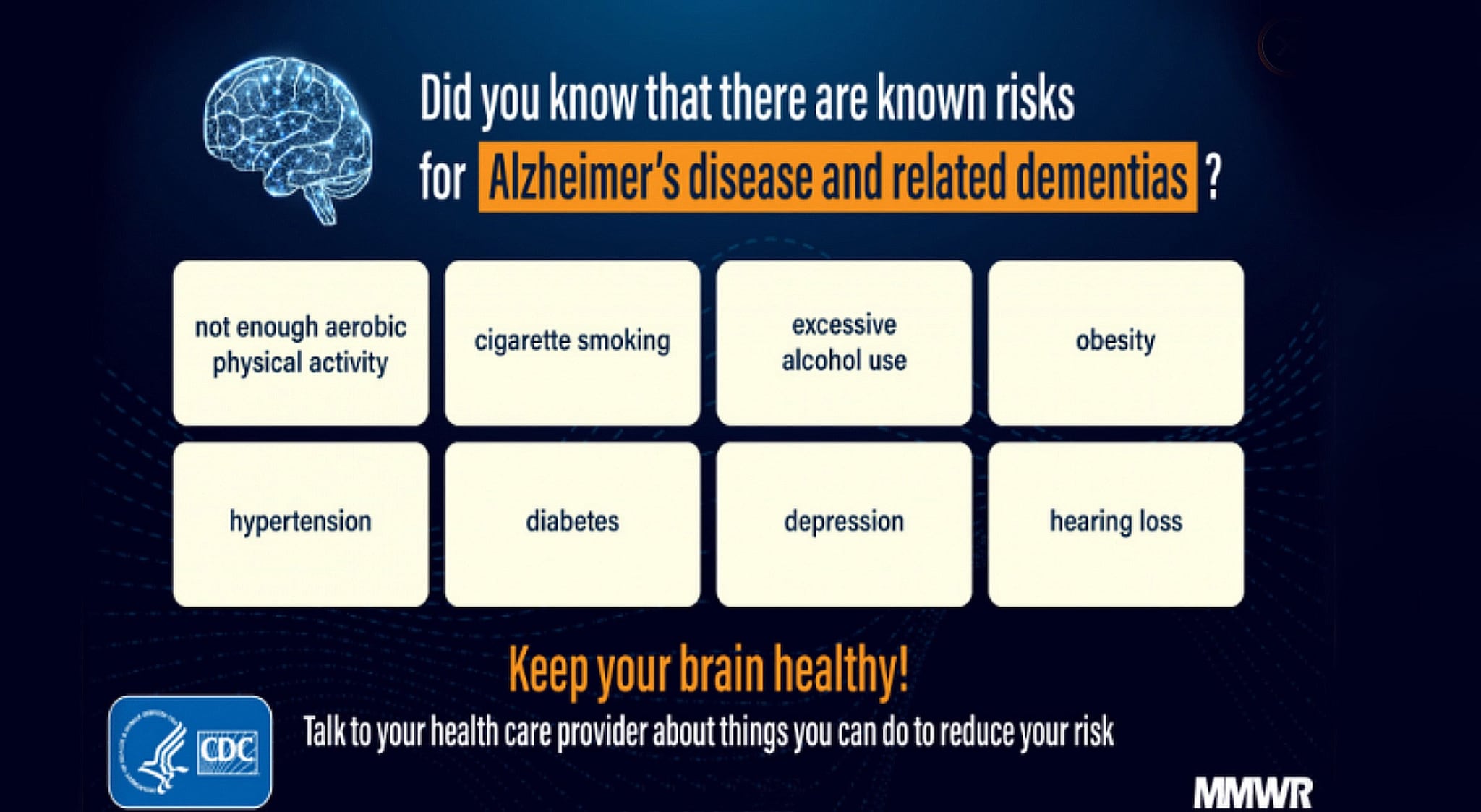Purpose
- There are common conditions and lifestyle behaviors that can increase your risk for dementia.
- Learn what they are and the healthy lifestyle habits that can lower your risk of developing dementia, including Alzheimer's disease.

Risk factors
There are known factors that can increase your risk of dementia. These include:
- Lack of physical activity.
- Uncontrolled diabetes.
- High blood pressure.
- Hearing loss.
- Tobacco and alcohol use.
Racial/ethnic differences
A recent study found that certain racial/ethnic groups, including African American, Hispanic, and American Indian and Alaska Native adults, were more likely to have these risk factors.1
- This is important, because those same racial/ethnic groups are also more likely to develop dementia than other groups.

Ways to lower your risk of dementia
Did you know?

Healthy lifestyle habits
Healthy habits can benefit brain health by:
- Reducing the chances of worsening memory loss.
- Slowing the progression of dementia, including Alzheimer's.
Here are five lifestyle habits to keep your brain healthy:
1. Stay physically active.
Physical activity is important to keeping your heart, body and brain healthy. What is good for your body is good for your mind.
- Regular physical activity can help you prevent, delay, or manage chronic diseases, like dementia.
- Experts recommend that adults get 150 minutes of physical activity each week (at least 20 minutes/day).
2. Prevent or manage diabetes.
When diabetes is not managed, important organs—like the brain—can be damaged by too much sugar in the bloodstream. The good news is type 2 diabetes can be prevented or delayed.
- Learn how to manage your blood sugar if you have diabetes.
3. Manage your blood pressure.
High blood pressure can damage blood vessels and limit blood flow to the brain, which does damage to the brain. It also increases the risk of having a stroke, which can also damage the brain.
- Maintaining a healthy weight and taking your prescribed blood pressure medications can help.
- Talk with your health care provider if you’re concerned about high blood pressure.
4. Prevent or correct hearing loss.
Hearing loss is a very important risk factor for dementia.2 Researchers believe having hearing loss may make the brain work harder at the expense of thinking and memory.3 Hearing loss also leads people to be less socially engaged, which is important to remaining intellectually stimulated.
- Treating hearing loss (using hearing aids) may reduce the risk of dementia.
- If you have or are concerned about hearing loss, talk to a hearing care professional to prevent, treat, or manage hearing loss.
5. Try to limit or avoid drinking alcohol and smoking.
Over time, excessive drinking can lead to high blood pressure or brain injuries, both of which increase the risk of dementia. Current smoking also increases the risk of developing dementia, including Alzheimer's disease.
- If you drink alcohol, do so in moderation. Learn about alcohol use and your health.
- Quit smoking to reduce your risk dementia. Quitting smoking also reduces other risks for dementia, like stroke, type 2 diabetes, and high blood pressure.
- Omura, JD, McGuire LC, Patel, R., et al. Modifiable risk factors for Alzheimer disease and related dementias among adults aged ≥45 years — United States, 2019. MMWR Morb Mortal Wkly Rep. 2022;71(20), 680–5. Doi: https://doi.org/10.15585/mmwr.mm7120a2
- Livingston G, Huntley J, Liu KY, et al. Dementia prevention, intervention, and care: 2024 report of the Lancet standing Commission. The Lancet. 2024;404(10452). doi: https://doi.org/10.1016/s0140-6736(24)01296-0
- Johns Hopkins. Hearing Loss and the Dementia Connection. Accessed August 26, 2024. https://publichealth.jhu.edu/2021/hearing-loss-and-the-dementia-connection
